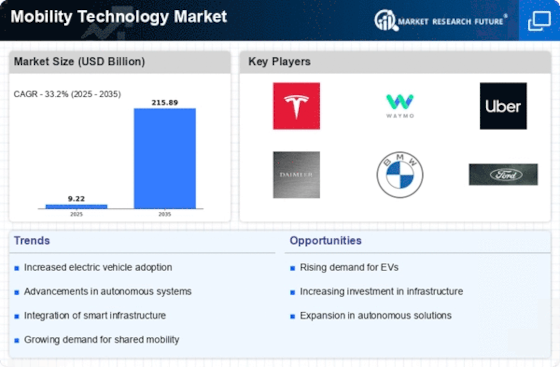Market Analysis
In-depth Analysis of Mobility Technology Market Industry Landscape
The Mobility Technology Market is a dynamic and rapidly evolving sector driven by various market factors that shape its growth and direction. One of the primary factors influencing the market is the increasing global demand for efficient and sustainable transportation solutions. As urbanization continues to rise, the need for mobility technologies that can alleviate traffic congestion and reduce environmental impact becomes more pronounced. This has led to a surge in the development and adoption of electric vehicles, smart transportation systems, and other innovations that promote eco-friendly and efficient mobility.
Another significant market factor is the ongoing advancements in technology, particularly in areas such as artificial intelligence (AI), Internet of Things (IoT), and connectivity. These technological developments are instrumental in the evolution of mobility technologies, enabling the creation of intelligent and interconnected transportation systems. AI-driven solutions, for instance, enhance the efficiency of autonomous vehicles and optimize traffic management. The integration of IoT allows for real-time data collection and analysis, contributing to the creation of smarter and safer mobility ecosystems.
Government regulations and policies also play a crucial role in shaping the Mobility Technology Market. Many countries are implementing stringent emission standards and promoting the adoption of electric vehicles to combat environmental challenges. Incentives, subsidies, and regulatory frameworks that encourage the development and use of sustainable mobility solutions have a direct impact on the market's trajectory. Companies operating in this space must navigate and adapt to these regulatory landscapes to ensure compliance and capitalize on emerging opportunities.
Furthermore, consumer preferences and behaviors significantly influence the mobility technology market. As consumers become more environmentally conscious, there is a growing demand for eco-friendly and sustainable transportation options. Electric vehicles, ride-sharing services, and other green mobility solutions are gaining popularity as consumers seek alternatives that align with their values. User experience, convenience, and cost-effectiveness also play pivotal roles in shaping consumer choices within the mobility technology market.
Collaborations and partnerships among industry stakeholders are emerging as key market factors driving innovation and growth. With the convergence of various technologies, companies are increasingly forming alliances to leverage each other's strengths and create integrated mobility solutions. Collaboration between automakers, technology companies, and infrastructure providers is fostering the development of comprehensive and seamless mobility ecosystems that cater to diverse consumer needs.
The global economic landscape also influences the Mobility Technology Market. Economic stability and growth contribute to increased investments in research and development, allowing companies to pursue ambitious projects and innovations. Conversely, economic downturns may lead to a temporary slowdown in spending on mobility technologies, affecting market dynamics.
In conclusion, the Mobility Technology Market is shaped by a combination of factors ranging from technological advancements and government regulations to consumer preferences and economic conditions. The ongoing pursuit of sustainable and efficient transportation solutions, coupled with the integration of cutting-edge technologies, ensures that the market remains dynamic and responsive to the evolving needs of society. As the world continues to embrace the era of smart and sustainable mobility, the market factors will continue to play a pivotal role in shaping the future of mobility technology.


















Leave a Comment